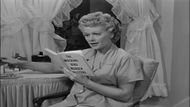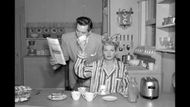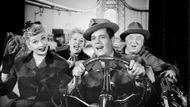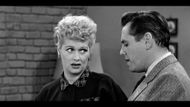Before streaming services, before binge-worthy dramas, before television became high art, there was I Love Lucy. It wasn’t just a sitcom. It was a phenomenon. A revolution that came wrapped in laughter, mischief, and the wide-eyed charm of one redheaded woman who refused to stay in her lane.
When I Love Lucy premiered in 1951, TV was still trying to figure out what it could be. Then came Lucy Ricardo, housewife, dreamer, chaos-bringer, determined to break into show business despite zero credentials and even less luck. And somehow, millions of viewers fell head over heels for her.
A Risk That Changed Everything
Lucille Ball wasn’t new to the screen when I Love Lucy debuted, but she’d never been given the stage she deserved. So she made one. When CBS approached her to bring her successful radio show to television, she agreed, but only if her real-life husband, Desi Arnaz, could play her on-screen spouse. A Cuban bandleader married to a white American actress? In 1951, that was radical.
But Lucille stood firm. Together, she and Desi created Desilu Productions and turned television upside down. They pioneered multi-camera filming. They insisted on using film instead of tape so reruns could be aired, a move that eventually made TV syndication an industry standard. They didn’t follow the rules. They rewrote them.

Lucy’s World: Messy, Loud, and Perfectly Relatable
Lucy didn’t try to be elegant or poised. She wasn’t the perfect wife. She wasn’t even all that talented, at least in the world she was trying to break into. But she wanted more, more than cooking, cleaning, and standing by while Ricky stole the spotlight.
And she tried. Oh, how she tried. Whether she was stomping grapes in Italy or shoveling chocolates into her mouth on a factory line, Lucy Ricardo was relentless. And it was beautiful. Because under every pratfall and raised eyebrow, there was a woman who just wanted to be seen.

The Cast: Bigger Than the Screen
Lucille Ball wasn’t just playing a part, she was building a legacy. Born in 1911 in upstate New York, she spent years grinding through modeling gigs and bit roles before finding her voice in comedy. I Love Lucy turned her into a household name, but her impact went far beyond performance. After the series, she launched The Lucy Show and Here’s Lucy, eventually becoming the first woman to run a major television studio. She passed away in 1989, but her influence? Still everywhere.
Desi Arnaz, born in Santiago de Cuba, was more than a charming sidekick. He was a business visionary. He saw the future of television before anyone else did. Behind his on-screen charisma was a brilliant strategist who helped invent modern production as we know it. He and Lucille divorced in 1960, but their love and respect never really faded. Desi died in 1986, and not long before her own passing, Lucille wrote him one last letter. It ended with three words: “I love you.”
Vivian Vance, who brought Ethel Mertz to life, was the best friend Lucy ever needed. Sarcastic, loyal, often exasperated, but always there. Off-screen, she and Ball had a deep, enduring friendship. Despite tensions with her co-star William Frawley, her warmth shone through every scene. She passed away in 1979 after a battle with cancer.
William Frawley, the gruff but lovable Fred Mertz, had a long film career before landing the role that would define him. Known for his sharp tongue and old-school attitude, Frawley clashed with Vivian Vance off set, but onscreen, their chemistry was undeniable. He died in 1966, just after watching a game at his favorite theater.
Keith Thibodeaux, the boy who played Little Ricky, was just five when he joined the show, and a musical prodigy. His drumming talents were real, and his presence added a touch of sweetness to the later seasons. Today, he’s the last living member of the main cast. He’s a musician, a family man, and still speaks with affection about his time with Miss Ball.

More Than Laughs: A Cultural Earthquake
During its six-season run, I Love Lucy didn’t just top ratings, it demolished records. At its peak, it drew in more viewers than the U.S. presidential inauguration. It won Emmys, rewrote technical standards, and set the tone for every sitcom that came after.
But its impact can’t be measured in awards alone. Lucy was a woman who wanted more than what the world told her she was allowed to have. And Desi, an immigrant and outsider in 1950s America, was portrayed not as a stereotype but as a loving husband, equal partner, and smart businessman.
The show tackled taboo topics gently but boldly: interethnic marriage, pregnancy (though they weren’t allowed to say the word), and the frustrations of domestic life.

What Remains After the Laughter
Decades later, I Love Lucy still resonates. Not because it’s old. But because it’s human. Watch Lucy try to keep up with the chocolate conveyor belt, and it’s not just comedy, it’s every one of us, in over our heads, trying to hold it together.
The magic wasn’t in the gags. It was in the heart. The timing. The courage to be foolish and still lovable. These characters didn’t just visit our homes, they moved in.
Rewatching I Love Lucy today doesn’t feel like looking back. It feels like reconnecting. Lucy and Ricky. Ethel and Fred. The music, the mayhem, the magic. They’re still here. Still making us laugh. Still reminding us that sometimes the bravest thing you can do… is just show up and try.
